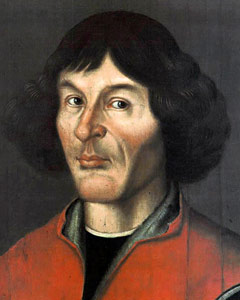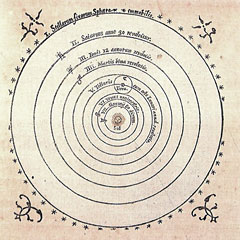
Nicolaus Copernicus
1473 - 1543
Astronomer and father of the heliocentric (Sun-centered) theory of the Solar System, commonly known as the Copernican system.
Considered to be the father of modern astronomy.
Considered today to be the father of modern astronomy, Nicolaus Copernicus was born on February 19, 1473 in Torun, Poland. He was the son of a prosperous merchant. After his father's death, he was raised by his uncle, who was a wealthy Catholic bishop. His Uncle was able to get him into the University of Krakow, which was famous at the time for its curriculum in mathematics, astronomy, and philosophy. Copernicus later studied liberal arts at Bologna, medicine at Padua, and law at the University of Ferrara. In 1500 he lectured on astronomy in Rome, and in 1503 he graduated from Ferrara with a doctorate degree in canon law. Shortly afterward, in 1507, Copernicus returned to Poland where he was elected a canon of the church. He faithfully performed his ecclesiastical duties, but also practiced medicine, wrote a treatise on monetary reform, and eventually turned his attention to the subject of astronomy.

Copernicus' interest in astronomy eventually grew into that of his primary interest. He worked alone and without help or consultation. His observations were made without the use of optical instruments, which were not invented until a hundred years later. He observed from a turret situated on the protective wall around the cathedral. In 1530, Copernicus completed his first great work entitled De Revolutionibus Orbium Coelestium (On the Revolutions of the Heavenly Spheres). It was in this book that he asserted that the Earth rotated on its axis once each day and that it traveled around the Sun once each year. This was a fantastic idea at the time. Up to the time of Copernicus, the thinkers of the western world believed in the Ptolemiac theory that the universe was a closed space bounded by a spherical envelope beyond which there was nothing. They believed that the Earth was the center of the universe and that the stars, planets, and Sun revolved around the stationary Earth. This was known as the geocentric (Earth-centered) theory. Copernicus was in no hurry to publish his book, as he was a perfectionist and believed his observations needed to be checked and rechecked.
Thirteen years after it was written, in 1543, De Revolutionibus Orbium Coelestium was finally published. Unfortunately, Copernicus died later that year and was never to know of the great controversy he had created. It is said that he apparently received the first copy of his book on his deathbed, as he lay dying on May 24, 1543 in Frombork, Poland. His great book went against the philosophical and religious beliefs that had been held during the medieval times. The church believed that man was made by God in his image, and was therefore the next thing to God. Thus, man was superior to all creatures and was not even a part of the natural world. It was feared that Copernicus' theories might well lead men to think that they are simply part of nature and not superior to it and that ran counter to the theories of the political powerful churchmen of the time. His work forever changed the place of man in the cosmos. The revelation of the heliocentric (Sun-centered) theory marked the beginning of the scientific revolution and a new view of the universe.




